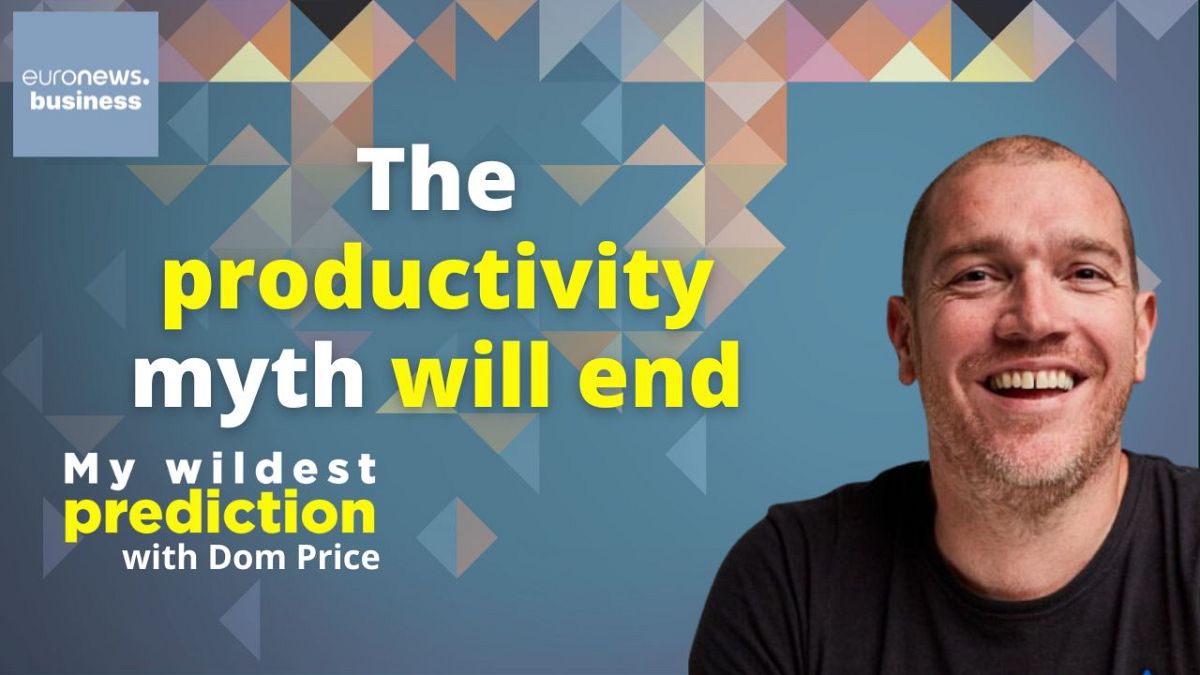My Wildest Prediction is a podcast series from Euronews Businesswhere we dare to imagine the future with business and tech visionaries. In this episode, Tom Goodwin talks to Dom Price, a work futurist at Sydney-based software company Atlassian, about his commitment to making companies re-evaluate their approach to success.
Productivity is one of the most valued qualities by both companies and individuals. In a 2022 survey by EdTech company Headway, over half of the 1 million participants from across Britain, the US and Australia said that they prioritised productivity over health, financial gain, and happiness.
But in trying to efficiently turn inputs into outputs, is something more significant being overlooked?
According to Dom Price, a work futurist at Sydney-based software company Atlassian, focusing too much on productivity may cause people to ignore the broader impacts of their decisions. Price joins My Wildest Prediction to share his ideas on how work and its impact on society could be reframed.
Is productivity the right metric?
“My wild one is we get rid of the fetish around productivity,” Price told Euronews Business when asked about his wildest prediction.
“I don’t know any leader that has the desire to have on their gravestone ‘Was productive’,” Price remarked. “So if it’s not that desire, then what are we doing it for?”
Among the issues Price identified with productivity is that it rarely considers broader goals like creating a sustainable impact, personal fulfilment, or building a more meaningful society.
Price is also sceptical about using productivity as a method to measure efficient work, as, according to him, this metric is difficult to quantify.
In the pursuit of measuring and boosting productivity, individuals and companies risk adopting approaches that may diminish creativity.
For instance, applications that track human-device interaction to measure productivity do not take the time spent on free thinking into account. As a result, they may mislabel these periods as unproductive, potentially discouraging individuals from coming up with original ideas.
“I had a real example of this a few years ago—a company using surveillance software. They nearly fired the chief of staff to the CEO,” Price said.
He described how in reality the employee had spent an entire day building a presentation for the CEO, “But she wasn’t connected while she built it. So no keystroke was recorded”.
The cost of productivity
Price thinks that material outcomes like a higher profit margin overshadow several intangible costs.
He recounted his conversation with a call centre owner, who explained how he could reduce between one-third and a half of his workforce using AI.
“So what happens to that society?” said Price.
“Microsoft made some money because they sold you some co-pilots. Your shareholders are better off. None of your staff is a shareholder, by the way. So what happens to those 30 or 1000 employees that get displaced?”
Price described how, while aspiring for more efficient outcomes only on material terms, companies put little to no emphasis on the emotional and human elements of the workplace. He said that instead of coming up with strategies that focus solely on maximising gains, companies could try introducing practices to put the individual at the forefront.
Price shared an idea he terms: ‘My User Manual’. It is essentially a document through which employees can articulate key aspects of themselves, such as their values, preferred feedback style, common irritants, working habits, and personal circumstances.
“It’s your operating system, and you share it with each other,” he added.
For instance, the document may include details about family life or time zone differences that could impact availability—such as noting that early morning meetings might be difficult due to school drop-offs.
Price also mentioned that the work environment can be enhanced by increasing flexibility and letting employees know that they’re not restricted to important tasks at the office. He argued that people tend to produce more original ideas when they’re not held back by the fear of potential consequences.
Additional sources • Johan Breton Video Editor and Sound Mixer

